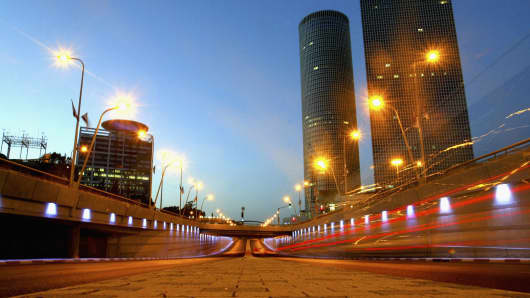This week (Monday) the government announced the formation of a committee that will issue recommendations on infrastructure spending by December. And one of the country's economic institutes linked Israel's low labor productivity to the gap in infrastructure capital.

"We focus on what the government can do to improve productivity and we suggest it's a good time for the government to invest in transportation capital, in public transportation, roads, mainly trains, buses, bus routes, etc.," Zvi Eckstein, head of the Aaron Institute for Economic Policy that published the study on productivity, told CNBC. The government committee follows on a 2016 decision to improve public transport in the country's metropolitan areas. Eckstein, a former deputy governor of the Bank of Israel, said that transportation, including roads and railways, generally accounts for 70 percent of infrastructure investments in developed economies.In order to close the infrastructure gap with the U.S. and Europe, Israel would have to double its current, low level of infrastructure spending from 1.8 percent to close to 4 percent over the next 15 years, said Eckstein. That was not such an outlandish thought, he noted, given for example the U.S. level of spending that stands at some 3 percent. The infrastructure shortfall translates into some NIS470-600 billion ($132-169 billion), it emerged from the study. The link to productivity is obvious, said Eckstein: "For the U.S., there have been many studies by academic economists that show that the impact of the huge interstate investments in the 50s and the 60s was one of the major sources for the huge growth of GDP per capita and really made the U.S. into what it is today."The study recommends public-private partnerships, PPPs, or build-operate-transfer, BOTs, to achieve the needed infrastructure investments but also says that given the current low-interest rates, public investment alone is not out of the question either.

"We claim it would be reasonable to actually increase debt, taking a loan either international or local because we find from our estimate that doubling investment will increase the growth rate by one percent. And given that it will increase the debt also by one percent, debt-to-GDP would stay constant," said Eckstein. Involving the private sector does remain highly likely. There is a lot of liquidity among institutions such as pension funds and insurance companies that would jump on such investment opportunities. Foreign investors too would welcome the opportunity, Eckstein estimated. Tom Maurice at Tel Aviv consultancy TASC said that the market has taken notice that new projects may be on the horizon: "We're going to have a very interesting few years in the infrastructure market in Israel. There is a lot of potentials here as there are many projects that need to be accomplished."With the proven track record of the private sector in delivering projects I think there's a lot of reason to believe a lot of that investment will go through the private sector," he said. The private sector has been increasingly involved in what Maurice calls a "maturing" infrastructure market. More and more sectors are opening up to private investment, he said. Even the military is now using BOT-type projects to build new bases. Other sectors where private or public-private projects are playing their part are Roads, light rail, desalination, independent power production, renewables like wind, solar and thermal-solar power, seaports, long-term rental housing, government buildings, waste treatment and more.

Many of the projects involve Israeli companies and investors but a substantial number is also being carried out and sometimes operated by foreign companies, including Chinese ones that are, for example, building a port in Ashdod and a light railway line in Tel Aviv. At the current level of spending, there is enough liquidity in Israel, said Maurice. But that could change."Obviously, if there's going to be a big push in infrastructure and that push is expected to come from the private sector, through equity and debt, then the market is going to become more interested in getting that equity and that debt into the country from abroad," he said. But both Maurice and the Aaron Institute's Eckstein warned that regulation and Israel's bureaucracy could make things uncertain for investors. "The question is how quickly these projects and investments will be able to go to the market and begin construction as they have to pass the whole regulatory and statutory system before you can start building," said Maurice. Eckstein said that the problem with the ease of doing business in Israel was something that needed to be addressed in parallel to the investment in infrastructure: "A key aspect is reducing the burden of bureaucracy. Israel's ease of doing business ranking by the World Bank is 52 and that is a disaster and a shame."A final recommendation included in the Aaron Institute's report was to invest in professional education. Eckstein pointed out that while Israel's high-tech sector employs ten percent of the workforce, the remaining 90 percent often are, "not well trained, especially the one not having an academic degree." Investing in professional schools was another crucial step to address the productivity gap, he said.














